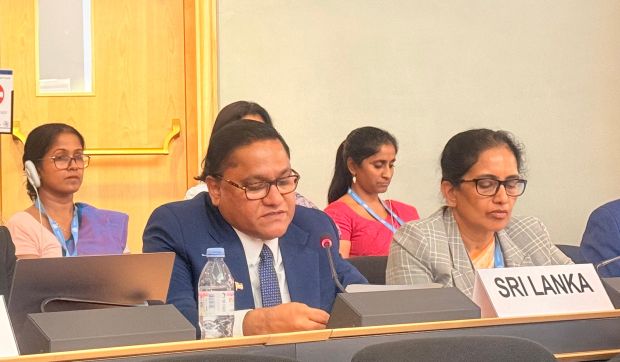Sri Lanka tells UNHRC it will not accept external accountability mechanisms
COLOMBO – Sri Lanka on Monday (8) rejected calls for international accountability initiatives, telling the United Nations Human Rights Council (UNHRC) that domestic mechanisms are sufficient to address reconciliation and human rights concerns.
Delivering Sri Lanka’s national statement at the Council’s 60th Session in Geneva, Foreign Minister Vijitha Herath, who also oversees Foreign Employment and Tourism, said external mechanisms such as the Sri Lanka Accountability Project would “only serve to create divisions and jeopardize genuine national efforts already underway.”
“The government is fully cognizant of the responsibility that accompanies the unprecedented mandate it has received from the people,” Herath said, adding, “We sincerely believe that external action will only serve to create divisions… The government is opposed to any external mechanism imposed on us such as the Sri Lanka Accountability Project.”
Herath’s statement comes as the High Commissioner for Human Rights, Volker Türk, presented his latest report on Sri Lanka, noting both progress and ongoing concerns, and that the country has an “opportunity to implement transformative reforms”.
Herath highlighted a series of steps taken since President Anura Kumara Dissanayake and his National People’s Power (NPP) government came to power in late 2024. He pointed to the strengthening of the Office on Missing Persons (OMP), Office for Reparations, and Office of National Unity and Reconciliation (ONUR), including an additional allocation of Rs 375 million to expedite inquiries.
Plans are also underway to establish a Truth and Reconciliation Commission (TRC), while independent investigations into grave sites such as Chemmani are being carried out under judicial oversight, he said, adding that courts have recently demonstrated their independence through rulings that highlight the possibility of accountability through domestic channels.
“We are also committed to ensuring that any person alleged to have committed any unlawful act is investigated, prosecuted and brought before courts through an independent national process, irrespective of their social status, background or any other ground,” he said.
Herath reminded the Council that President Dissanayake was elected in September 2024 on a wave of popular support, with parliamentary elections in November cementing a strong mandate from all provinces, including the North and East. He described the current Parliament as the most inclusive in Sri Lanka’s history, with more women, minority representatives, and even a visually impaired member.
Since taking office, the government has held delayed local government elections, which were conducted peacefully and without allegations of misuse of state resources – a first in decades, according to the minister.
Economically, Herath said the government had stabilized the country after the severe crisis of 2022–2023 and was now focused on fairer distribution of opportunities. The 2025 budget allocated record sums to health and education, alongside targeted welfare for farmers, fishers, plantation workers, women, children, and people with disabilities.
Herath also pointed to broader reforms. New anti-corruption legislation has led to several convictions, while the ‘Clean Sri Lanka’ program is promoting ethical governance across state institutions, he said.
In the legal sphere, a new counter-terrorism law is being drafted to replace the controversial Prevention of Terrorism Act (PTA), amendments are underway to the Online Safety Act, and a new Organized Crime Bill is in preparation, he said.
Herath also noted that or the first time, the government formally recognized the Malaiyahar community as a distinct group and that over 5,000 new houses are to be handed over to plantation families, alongside wage reforms for estate workers. Draft legislation to strengthen women’s, children’s, and disability rights is also being developed, he added.
Herath noted that Sri Lanka had engaged constructively with the UN system, citing the June 2025 visit by High Commissioner Türk, who he said acknowledged the government’s openness and efforts to tackle corruption.
But he pushed back strongly against international pressure, arguing that external accountability would undermine fragile progress. “Our genuine and sincere approach, which is visible, needs to be reciprocated with deeper understanding and noticeable appreciation,” he said.
Herath urged Council members and observers to support Sri Lanka’s domestic processes rather than impose external solutions, stating, “This is a historic opportunity to advance reconciliation and human rights through Sri Lanka’s own initiatives”. He called on all stakeholders to join hands with the government in deepening mutual understanding and assisting Sri Lanka to seize this opportunity for the benefit of all our people.
-ENCL



Comments are closed, but trackbacks and pingbacks are open.